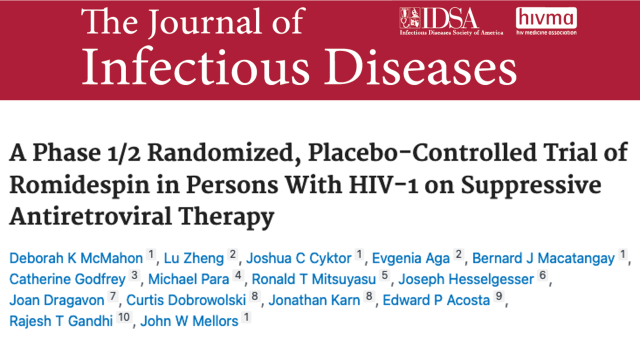A5315
A Phase I/II Study of Romidepsin in HIV-Infected Adults With Suppressed Viremia on Antiretroviral Therapy to Assess Safety, Tolerability, and Activation of HIV-1 Expression
A major challenge in eradicating HIV-1 infection is the persistence of virus in long-lived cells, such as latently infected memory CD4 T cells. One approach for eliminating the HIV-1 reservoir is to activate viral replication in these latently infected CD4 T cells by targeting cellular mechanisms that repress proviral transcription. Histone deacetylase inhibitors (HDACis), such as RMD, induce HIV-1 expression by increasing acetylation and facilitating transcriptional activation of HIV-1. RMD administered in combination with ART may serve as an important component of a strategy to eradicate the HIV-1 latent reservoir. The purpose of this study was to evaluate the safety and efficacy of single dose and multiple dose administration of RMD in HIV-infected adults.
Participants were sequentially enrolled into four cohorts and randomly assigned to receive either RMD or placebo. The cohorts differed in the dose of RMD given. Participants in Cohorts 1, 2, and 3 had one intravenous (IV) infusion of RMD or placebo at Day 0. Participants in Cohort 4 had four IV infusions of RMD or placebo at Days 0, 14, 28, and 42.
For participants in Cohorts 1, 2, and 3, study duration was 4 weeks. For participants in Cohort 4, study duration was a minimum of 24 weeks and a maximum of 48 weeks.
Participants attended several study visits, which could include a physical examination, blood and urine collection, pharmacokinetic (PK) sampling, and an electrocardiogram (ECG).
DURATION: May 2014 - April 2018
STUDY TYPE: HIV Treatment
PHASE: 1/2
DESIGN: Randomized, parallel assignment, triple masked, interventional study
STATUS: Complete
ENROLLMENT: 59
POPULATION: People living with HIV, 18+ years old
NUMBER OF SITES: 9
SITE LOCATIONS: US
RESULTS
